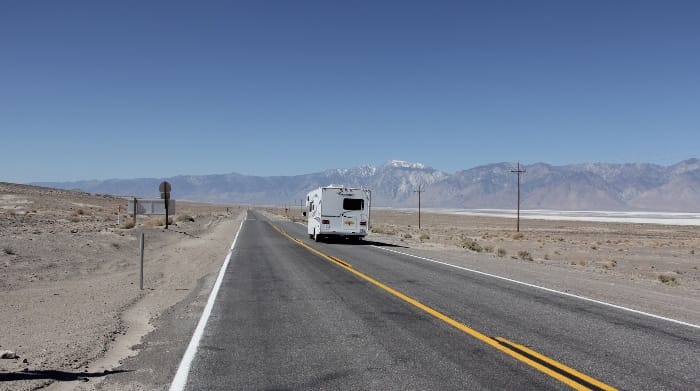For many, the worst part about traveling full-time is… well, traveling. Yes, that sounds ridiculous, but the truth of the matter is, travel day is a long and stressful day. Therefore, although we all like to change up the scenery and experience new things, the actual act of getting from point A to point B can be less than pleasant.
Fortunately, there are many rehabs to help reduce the amount of stress you experience when it comes time to move your rig to a new location. In fact, with a bit of preparation you may even find you’re able to enjoy the excitement of moving your home and seeing some new things.
Here are our top tips for planning an RV trip in such a way that you reduce stress on travel day and making a smooth and painless—or at least less painful—experience for the whole family.

Prepare the Rig
Nothing will take stress levels to the extreme like a breakdown. For this reason, it’s super important to make sure your rig is completely ready to travel before travel day rolls around:
- Check the tires, oil, and other fluids.
- Fill up with gas before pulling out.
- Make sure you’re hitched up properly.
- Be sure to address any weird noises before it’s time to hit the road.
>> Want to learn more about Fulltime Families Membership? Head here for more details and learn more.! <<
Have a Backup Plan
Of course, sometimes things go wrong with your rig even when you’re certain everything is in tip-top shape before you pull out. This is why roadside assistance is so very important.
Make sure you have a good, reliable, RV-specific roadside assistance service in place—and then to really cover your butt, make sure to carry spare tires, extra gas, jumper cables, and tools wherever you go.
Find RV-Specific Routes
Traffic, construction, and low bridges can all make travel day even more overwhelming. You can avoid a lot of these things by investing in an RV-specific GPS and checking the route beforehand, looking for traffic jams and construction zones along the way.
This simple change in how you navigate can be a lifesaver, and while taking the traffic- and construction-free routes may take a bit more time, this is usually well worthwhile when you consider the amount of stress it will remove from your life, we also recommend you to take A Texas driving safety course will help get your traffic ticket dismissed, this is always useful if you travel a lot on the road.
Make a To-Do List and Delegate Tasks
All the little things that need to be done when packing up to go can really add up and make travel day mornings a crazy frenzy.
Instead of trying to keep all of these things in your head, make a to-do list that you follow each and every time you move. Assign specific tasks to specific family members, and have everyone work together to get the whole cleanup and hitch-up process done as quickly as possible.
After a few times, you’ll have travel day mornings down to an art, and packing up will be a breeze.
Reduce Clutter and Give Everything a Place
Another thing that really helps make packing easier is reducing the amount of stuff you need to pack. Get rid of clutter and things you simply don’t use, and avoid putting lots of stuff outside of your rig when you set up camp.
Everything you do keep should have a very specific and secure place, and all family members should put items back where they belong after every use. This will remove the need to run around putting things away, creating new places for things, and securing items before you can move.
Start Preparing Early
Oddly enough, many people don’t even consider the idea that they may not have to do all of their packing on moving day. In fact, in many cases, it’s much easier to begin packing and preparing for moving day well in advance.
This might mean preparing breakfast, packing lunches, and dumping the tanks the night before. It also might mean putting away camping chairs and other outside items a couple of days in advance.
The more you can do ahead of time, the less you’ll have to worry about the day of, and considering the number of tasks most people have to take care of on travel day, this is definitely a good thing.
Skip the Cleaning
It might seem logical to clean up the rig before each move, and for some people this might work out just fine. However, this isn’t always the best way to do things.
If you find yourself stressing out about cleaning the floors before you’re willing to leave a campsite, only to find them dirty again once you arrive at your destination, it might be better to wait and do the cleaning another day after settling into your new campsite.
Obviously, this doesn’t remove the need to put things away before you move, but it certainly does cut down your to-do list when you need to worry about mopping, scrubbing the bathroom, or cleaning the windows.
Take Your Time
Perhaps the very best tip for reducing travel day stress is to take your time. This little bit of advice applies in a few different ways, and it is extremely helpful in all instances.
- The first instance? Take your time when you’re between travel days. Leave plenty of time to explore a place, get comfortable, and even get sick of a place before you need to move again. This will make everyone a bit more eager to get moving when travel day rolls around.
- The next instance where this can be applied is to travel prep. Nobody likes to get up and rush out the door. Therefore, it’s always a good idea to give yourself plenty of time to do the packing. The idea of starting a few days ahead of time definitely helps with this, but so does setting an alarm and getting out of bed with plenty of time to pack at a leisurely pace before checkout time.
- Finally, you can apply this bit of advice to the traveling itself. Since you travel with your entire home, there is rarely any real reason to rush from one place to the next. Allow yourself plenty of time to travel to your destination, planning only 2–4 hours of driving time each day and stopping often in order to stretch your legs and give your body a break.
Some people choose to do 2 or 3 short days in a row, stopping to dry camp in between. Others will only choose destinations that are four or less hours apart. However you choose to do it, you’re sure to appreciate the shorter, less mentally exhausting travel days.
Join Fulltime Families
Fulltime Families Members get access to the best resources, community and discounts.
Fulltime Families is a participant in the Amazon Services LLC Associates Program, an affiliate advertising program designed to provide a means for sites to earn advertising fees by advertising and linking to amazon.com, amazon.co.uk, amazon.ca. Amazon and the Amazon logo are trademarks of Amazon.com, Inc. or its affiliates.



